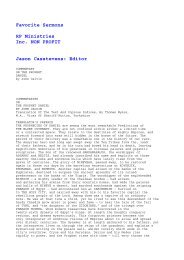Lamentations - The Sermon Depository
Lamentations - The Sermon Depository
Lamentations - The Sermon Depository
Create successful ePaper yourself
Turn your PDF publications into a flip-book with our unique Google optimized e-Paper software.
saccis; demiserunt (vel,<br />
demittunt) ad terram caput suum<br />
virgines (aut, puellae) Jerusalem.<br />
<strong>The</strong> Prophet here strikingly represents the grievousness of the people’s<br />
calamity, when he says, that the elders, as in hopeless despair, were lying<br />
on the ground, that they cast dust on their heads, that they were clad in<br />
sackcloth, as it was usually done in very grievous sorrow, and that the<br />
virgins bent their heads down to the ground. <strong>The</strong> meaning is, that the<br />
elders knew not what to do, and led others. to join them in acts of fruitless<br />
and abject lamentation. We indeed know that young women are overcareful<br />
as to their form and beauty, and indulge themselves in pleasures;<br />
and that when they roll themselves with their face and hair on the ground,<br />
it is a token of extreme mourning. This is what the Prophet means.<br />
<strong>The</strong>y were wont indeed to put on sackcloth as a token of repentance, and<br />
to cast dust on their heads; but their minds were often so confused, that<br />
they only thus set forth their mourning and sorrow, and had no regard to<br />
God; and hypocrites, when they put on sackcloth, pretended to repent,<br />
but it was a false pretense. Now in this place the Prophet does not mean<br />
that the elders by adopting these rites professed to repent and humbly to<br />
solicit pardon; but refers to them only as tokens of sorrow; as though he<br />
had said, that the elders had no resources, and that the young women had<br />
no hope nor joy. For the elders did lie down on the ground, as it is usual<br />
with those who have no remedy. We now understand the meaning of the<br />
Prophet. F35 It follows, —<br />
<strong>Lamentations</strong> 2:11<br />
11. Mine eyes do fail with tears,<br />
my bowels are troubled, my liver<br />
is poured upon the earth, for the<br />
destruction of the daughter of my<br />
people; because the children and<br />
the sucklings swoon in the streets<br />
of the city.<br />
11. Defecerunt in lachrymis<br />
oculi mei, conturbata sunt<br />
viscera mea, effusum est ad<br />
terram jecur meum, propter<br />
contritionem filiae populi mei,<br />
dum evanuit parvalus et sugens<br />
Ubera in compitis urbis.<br />
<strong>The</strong> Prophet himself now speaks, and says that his eyes were consumed<br />
with tears, while weeping on account of the calamities of the people: even<br />
in the deepest grief tears at length dry up; but when there is no end of<br />
weeping, the sorrow, which as it were never ripens, must necessarily be<br />
very bitter. Jeremiah then expresses now the vehemence of his grief when<br />
he says that his eyes failed through shedding tears. He said in Jeremiah 9,<br />
“Who will give me eyes for fountains?” that is, who will make my eyes to<br />
turn into fountains, that they may continually flow? and this he said,<br />
because he saw how dreadful a vengeance of God impended over the<br />
obstinate. But now, when he sees accomplished what he had dreaded, he<br />
says, that his eyes were consumed with weeping.<br />
To the same purpose is what he adds, that his bowels were disturbed. It is<br />
the same verb as we have seen before, wrmrmj, chemermeru; which some<br />
render “bound,” as we also said then. I know not why one expositor has<br />
changed what he had elsewhere said rightly; he puts here, “swollen have<br />
my bowels.” But I see no reason why the verb should be taken here in a<br />
different sense, for it immediately follows, my liver is poured forth on the<br />
ground. He may, indeed, have included other parts of the intestines by<br />
stating a part for the whole. <strong>The</strong> word here properly means the liver, as<br />
when Solomon says,<br />
“He hath pierced my liver.” (Proverbs 7:23.)<br />
But Jeremiah, in short, shews that all his faculties were so seized with<br />
grief, that no part was exempt. He then says that his liver was poured



